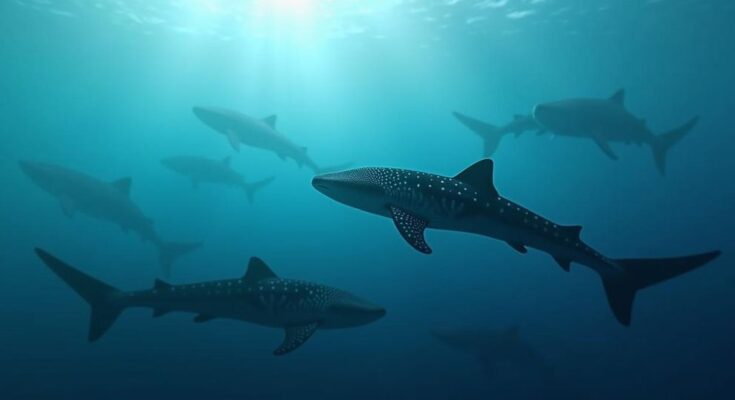A study warns that climate change significantly heightens the risk of whale sharks, the largest fish species, colliding with ships due to warmer oceans pushing them into busy shipping lanes. With projections indicating a potential increase in co-occurrence with large vessels by 15,000 times by 2100, urgent action is needed to mitigate climate change and protect these endangered creatures.
Recent research has highlighted that climate change is exacerbating the risk of whale sharks, the largest fish species, to fatal collisions with shipping vessels. This dire warning, issued by scientists from the University of Southampton and the Marine Biological Association, suggests that as ocean temperatures rise, these endangered creatures may be pushed into new habitats that overlap significantly with busy shipping lanes. The study, published in the journal Nature Climate Change, forecasts that the likelihood of whale sharks encountering large ships could increase by a staggering 15,000 times by the end of the century, particularly under severe emission scenarios. Dr. Freya Womersley of the University of Southampton noted, “These shifts in the whale sharks’ habitat were most extreme under high emission scenarios. A global reshuffling could lead to core habitat losses in some areas as well as increased co-occurrence with shipping traffic as oceans warm and other variables change.” Historically noted for their mobility and adaptability, whale sharks show alarming vulnerability to shipping traffic. The research utilized satellite tracking data and climate models to analyze future whale shark distributions under various climate conditions. Alarmingly, these projections indicate potential habitat reductions of over 50% in certain national waters by the year 2100, with the worst impacts expected in the Asian region. In contrast, scenarios adhering to sustainable development, which aim to limit global warming to 2 degrees Celsius, indicate potential habitat gains, particularly in European regions. Professor David Sims, co-author of the study, emphasized the importance of mitigating climate change’s effects, stating, “The shifts we predict are likely to be less extreme if we are able to slow warming and mitigate climate change.” The research findings reveal that potential new habitats for whale sharks may coincide with busy shipping routes, such as notable areas in the North Pacific Ocean, Eastern China Seas, and the North Atlantic Ocean, raising concerns for their safety. In some locations, like the Gulf of Mexico, core habitats have shifted to less congested coastal waters, reducing the risk of ship strikes.
The impact of climate change on marine species is an urgent concern as global warming continues to alter oceanic ecosystems. Whale sharks, known for their immense size and endangered status, exemplify how environmental changes can affect animal distribution and safety. Understanding their movement patterns in relation to climate change is crucial for effective conservation efforts, particularly as increasing shipping activities pose additional threats to these vulnerable marine creatures. This study serves as a vital indicator of how climate change not only reshapes habitats but also increases co-occurrence with human activities, underscoring the complexity of managing endangered species in a rapidly changing environment.
In summary, the research conducted by the University of Southampton and the Marine Biological Association reveals significant implications of climate change on the habitat of whale sharks. The stark increase in potential ship collisions due to shifting habitats necessitates immediate action to mitigate climate change. Efforts to slow global warming and regulate shipping activities could alleviate some of the negative impacts on whale sharks and enhance conservation strategies for this endangered species.
Original Source: www.fox28spokane.com




